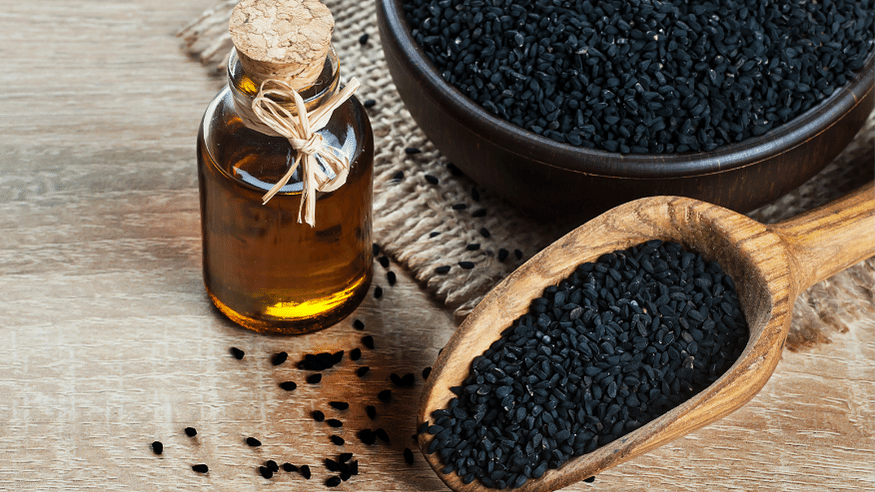Using black cumin or Kalonji is a Sunnah. Kalonji, also known as black seed or Nigella sativa, is a small flowering plant native to Southwest Asia. It has been consumed for centuries in traditional medicine for various health benefits. It is often used in many recipes in the Middle East or Asian buffet. Black seed holds a special place in Islamic traditions due to its Sunnah practices. Our Holy Prophet (peace be upon him) used and recommended black cumin as a remedy.
The Use of Black Cumin is recommended by Sunnah
Black cumin is a panacea for all diseases. The importance of using black cumin can be estimated by the Hadith of The Holy Prophet (peace and blessings be upon him). Abu Huraira narrated:
“I heard Allah’s Messenger (ﷺ) saying, “There is healing in black cumin for all diseases except death.” [1]
In light of this Hadith, it is confirmed that Kalonji has wide benefits for human health. It is a cure for all diseases except death.
In another incident, Khalid bin Sa’d narrated:
“We went out, and Ghalib bin Abjar was accompanying us. He fell ill on the way, and when we arrived at Medina, he was still sick. Ibn Abi’ Atiq visited him and said, “Treat him with black cumin. Take five or seven seeds and crush them (mix the powder with oil) and drop the resulting mixture into both nostrils, for `Aisha has narrated to me that she heard the Prophet (ﷺ) saying, ‘This black cumin is healing for all diseases except As-Sam.’ Aisha said, ‘What is As-Sam?’ He said, ‘Death.” [2]
Health Benefits of Black Cumin
Abundant health benefits have been observed in consuming black cumin in your regular diet like better physical health and improved immunity.
Anti-inflammatory in nature:
Kalonji contains compounds such as thymoquinone, which is known for its anti-inflammatory properties. It reduces inflammation, relaxes muscles, and relieves symptoms of arthritis and asthma. [3]
Antioxidant activity:
The seeds of Kalonji are rich in antioxidants. It helps to protect the body cells from the harmful effects of free radicals. Antioxidants play an important role in minimizing the chances of acquiring chronic diseases, such as heart disease and certain types of cancer.
Strengthen the Immune System:
Kalonji has been traditionally used for the improved activity of the immune system. It may enhance immune activity by stimulating the production of certain white blood cells, hence improving the overall defense system of the body.
Improve Digestion:
The seeds of Kalonji are believed to have digestive health benefits. They may help relieve symptoms of indigestion, such as bloating and constipation. Kalonji also possesses antibacterial properties, which fight against harmful bacteria in the digestive system.
Blood sugar regulation:
Some studies suggest that Kalonji may help regulate blood sugar levels. It may improve insulin sensitivity and reduce glucose absorption in the intestines, potentially benefiting individuals with diabetes or prediabetes.
Weight management:
Kalonji seeds are effective in weight management. They contain fiber and healthy fats, promoting feelings of fullness and reducing overall calorie intake. Additionally, the seeds help boost metabolism, hence supporting weight loss efforts.
Skin and hair health:
Kalonji oil is often used topically for skin and hair care. It moisturizes the skin, reduces inflammation, and alleviates conditions like eczema and psoriasis. Kalonji oil has nourishing properties for the hair, promoting hair growth and shine.
Sunnah of using Cumin Seeds is spiritually uplifting
By following the Sunnah of Our Holy Prophet (peace be upon him), we can achieve a high connection to the Creator and deen. Muslims should follow this Sunnah for spiritual health benefits, which are:
Spiritual Fulfillment:
Following the Sunnah brings a deep sense of spiritual fulfillment and satisfaction to us Muslims. By using Kalonji as a natural remedy, we are allowing ourselves to experience a connection to the teachings and practices of the Prophet Muhammad (peace and blessings be upon him) and build a stronger relationship with Allah. This obeying of the Sunnah becomes an act of worship and devotion, bringing inner peace and contentment to us all.
Divine Blessings:
We are always to believe that by following the Sunnah, we are inviting the blessings and mercy of Allah into our lives. When utilizing Kalonji, we seek healing and better well-being while aligning our actions with the guidance of the Prophet Muhammad (peace and blessings be upon him). This dedication to the Sunnah attracts Allah (SWT)’s favor and blessings in this world and the hereafter.
Strengthening Faith:
The act of embracing the Sunnah through the usage of Kalonji deepens our faith. It increases our belief in the teachings of Islam. It strengthens our conviction in the wisdom of the Prophet Muhammad (peace and blessings be upon him). By going through the health benefits and experiencing the rewards of following the Sunnah, we can develop a stronger bond with our faith and a deeper trust in Allah’s guidance.
Conclusion
Using black Cumin is Sunnah and as Muslims, we embrace its usage as a means of honoring the methods of the Prophet Muhammad (peace and blessings be upon him). By incorporating Kalonji into our lives, we can experience physical healing, nurture a spiritual connection, and embrace the holistic principles of Islam. It is essential to use Kalonji with knowledge and moderation, seeking guidance from healthcare professionals and understanding its potential interactions with specific medical conditions or medications. Embracing the Sunnah of Kalonji can lead us to a pathway of well-being. It is no doubt an opportunity to align our daily lives with the teachings of Islam.
Using black cumin, or Kalonji, is rewarding in the Islamic faith and a part of our content series. Follow our whole series, Time to Revive, where we discuss the forgotten Sunnah of Prophet Muhammad, Peace be Upon Him, and try to revive them by considering most of the perspectives of the modern world. Reading them and making them a habit is now your choice.
By: Jowairia Shahid
References
- Sahih al-Bukhari 5688: Book 76, Hadith 11
- Sahih al-Bukhari 5687: Book 76, Hadith 10
- Ainane T., Askaoui Z., Elkouali M., et al. Chemical composition and antibacterial activity of essential oil of Nigella sativa seeds from Beni Mellal (Morocco): What is the most important part, Essential Oil or the rest of the seeds? Journal of Materials and Environmental Science. 2014;5(6):2017–2020




